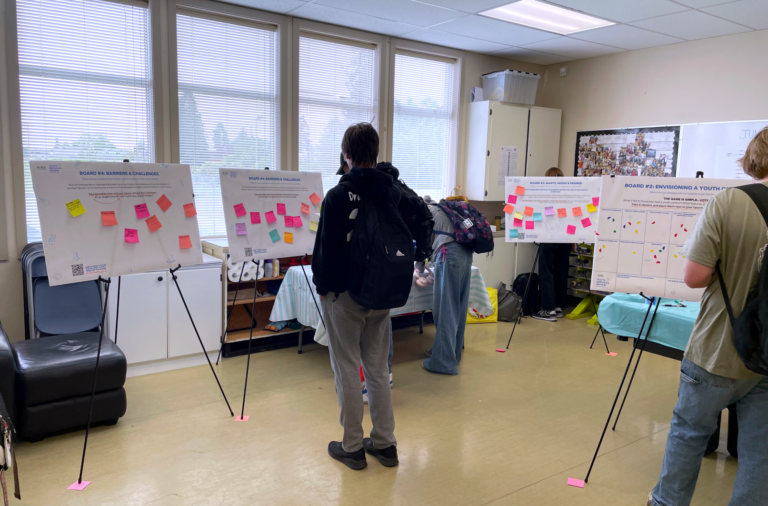
City of Kelowna - 2022
Creating Community Connections & Building Empathy Through Online Engagement
Creating Community Connections & Building Empathy Through Online Engagement
With the knowledge that one negative story or experience can bias the perspective of an entire community, the Central Okanagan Journey Home Society and the City of Kelowna embarked on a creative pilot project with Urban Matters to build empathy for people experiencing homelessness through a new online engagement methodology. The project involved hiring community members and people with lived or living experience of homelessness to become content creators, embarking on a transformative journey of storytelling in a local neighborhood Facebook group. The creators, also called ‘living experience educators’, were supported by a team to create a compelling story arc representing various aspects of homelessness and housing insecurity. Through social media metrics, responses such as comments and reactions were analyzed to learn more about the core drivers of stigma and their role in fostering positive or negative sentiments towards homelessness in Kelowna.
Impact
As an experimental pilot project, our approach was centered on learning about how stigma in the community manifests and is perpetuated and exploring the feasibility of leveraging social media platforms for individuals with lived experiences to share their stories. Several key insights emerged from this endeavor.
Firstly, we discovered that people’s engagement with storytelling content is finite. This realization led us to evolve our approach to a “less-is-more approach”, focusing on quality rather than quantity in our storytelling efforts.
One of the most significant impacts of the project was the empathy it generated between the content creators, who were individuals from the community, and their partners with lived experience of homelessness. This collaboration fostered a profound sense of understanding and compassion, transcending the traditional boundaries between storyteller and audience. Witnessing this empathy-building process firsthand highlighted the transformative potential of storytelling in breaking down barriers and fostering greater empathy within the community.
Moreover, the project shed light on the bidirectional nature of stigma surrounding homelessness. By amplifying the voices of individuals with lived experience, we not only sought to challenge negative stereotypes but also aimed to bridge the gap in understanding between those with lived experience and the broader community. This acknowledgment of the multifaceted nature of stigma underscores the importance of promoting mutual understanding and empathy as essential components of any effort to combat homelessness.
In summary, the project yielded valuable insights into the complex dynamics of stigma and empathy surrounding homelessness in Kelowna. By harnessing the power of storytelling and social media, we were able to initiate meaningful conversations, challenge preconceptions, and foster greater empathy and understanding within the community.
With the knowledge that one negative story or experience can bias the perspective of an entire community, the Central Okanagan Journey Home Society and the City of Kelowna embarked on a creative pilot project with Urban Matters to build empathy for people experiencing homelessness through a new online engagement methodology. The project involved hiring community members and people with lived or living experience of homelessness to become content creators, embarking on a transformative journey of storytelling in a local neighborhood Facebook group. The creators, also called ‘living experience educators’, were supported by a team to create a compelling story arc representing various aspects of homelessness and housing insecurity. Through social media metrics, responses such as comments and reactions were analyzed to learn more about the core drivers of stigma and their role in fostering positive or negative sentiments towards homelessness in Kelowna.
Impact
As an experimental pilot project, our approach was centered on learning about how stigma in the community manifests and is perpetuated and exploring the feasibility of leveraging social media platforms for individuals with lived experiences to share their stories. Several key insights emerged from this endeavor.
Firstly, we discovered that people’s engagement with storytelling content is finite. This realization led us to evolve our approach to a “less-is-more approach”, focusing on quality rather than quantity in our storytelling efforts.
One of the most significant impacts of the project was the empathy it generated between the content creators, who were individuals from the community, and their partners with lived experience of homelessness. This collaboration fostered a profound sense of understanding and compassion, transcending the traditional boundaries between storyteller and audience. Witnessing this empathy-building process firsthand highlighted the transformative potential of storytelling in breaking down barriers and fostering greater empathy within the community.
Moreover, the project shed light on the bidirectional nature of stigma surrounding homelessness. By amplifying the voices of individuals with lived experience, we not only sought to challenge negative stereotypes but also aimed to bridge the gap in understanding between those with lived experience and the broader community. This acknowledgment of the multifaceted nature of stigma underscores the importance of promoting mutual understanding and empathy as essential components of any effort to combat homelessness.
In summary, the project yielded valuable insights into the complex dynamics of stigma and empathy surrounding homelessness in Kelowna. By harnessing the power of storytelling and social media, we were able to initiate meaningful conversations, challenge preconceptions, and foster greater empathy and understanding within the community.



